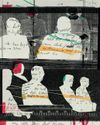
Scooter Braun was in a tailspin. It was February, 2021, and the music manager, who had made his name launching the careers of Justin Bieber and Ariana Grande, was nearing forty and facing a brutal divorce. An equally nasty battle with Taylor Swift, over his ownership of her song catalogue, had sullied his public image. Rumors circulated that the future of Braun’s company, Ithaca Holdings, was in doubt. Amid this tumult, he was surprised to receive an invitation to speak with someone who had long fascinated him: the South Korean producer Bang Si-hyuk—known to admirers as Hitman Bang.
Braun had first heard of Bang several years earlier, when a member of his social-media team told him about a boy band from South Korea whose onlineengagement numbers had surpassed even Bieber’s. Braun was skeptical and asked her to check the figures again in a week. They’d gone up. The group, BTS, became the biggest act in the world—and the one with the most zealous fan community, which routinely mobilizes online to insure that their boys top the charts. Bang had handpicked the group’s members and co-written many of its early hits.
Braun and Bang met on Zoom, and bonded over the fact that both had plucked young artists from obscurity and guided their meteoric ascents. “It was like finding a kindred spirit across the sea,” Braun told me. “I’ve never been able to talk to anyone about this stuff.” Soon, they were chatting three times a week. A month later, Braun sold his company to Bang’s hybe Corporation, in a deal worth upward of a billion dollars.
This story is from the October 14, 2024 edition of The New Yorker.
Start your 7-day Magzter GOLD free trial to access thousands of curated premium stories, and 9,000+ magazines and newspapers.
Already a subscriber ? Sign In
This story is from the October 14, 2024 edition of The New Yorker.
Start your 7-day Magzter GOLD free trial to access thousands of curated premium stories, and 9,000+ magazines and newspapers.
Already a subscriber? Sign In

GET IT TOGETHER
In the beginning was the mob, and the mob was bad. In Gibbon’s 1776 “Decline and Fall of the Roman Empire,” the Roman mob makes regular appearances, usually at the instigation of a demagogue, loudly demanding to be placated with free food and entertainment (“bread and circuses”), and, though they don’t get to rule, they sometimes get to choose who will.

GAINING CONTROL
The frenemies who fought to bring contraception to this country.

REBELS WITH A CAUSE
In the new FX/Hulu series “Say Nothing,” life as an armed revolutionary during the Troubles has—at least at first—an air of glamour.

AGAINST THE CURRENT
\"Give Me Carmelita Tropicana!,\" at Soho Rep, and \"Gatz,\" at the Public.

METAMORPHOSIS
The director Marielle Heller explores the feral side of child rearing.

THE BIG SPIN
A district attorney's office investigates how its prosecutors picked death-penalty juries.

THIS ELECTION JUST PROVES WHAT I ALREADY BELIEVED
I hate to say I told you so, but here we are. Kamala Harris’s loss will go down in history as a catastrophe that could have easily been avoided if more people had thought whatever I happen to think.

HOLD YOUR TONGUE
Can the world's most populous country protect its languages?

A LONG WAY HOME
Ordinarily, I hate staying at someone's house, but when Hugh and I visited his friend Mary in Maine we had no other choice.

YULE RULES
“Christmas Eve in Miller’s Point.”